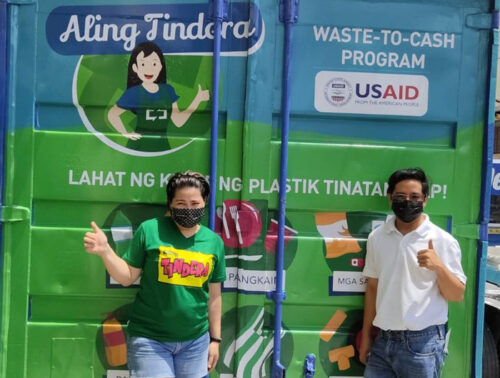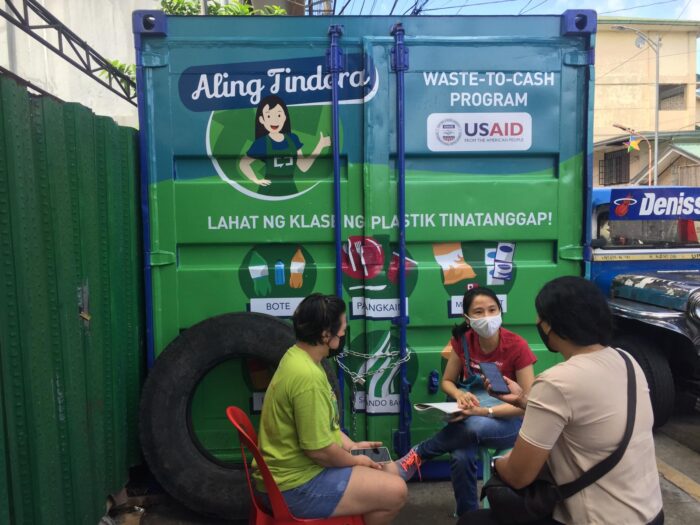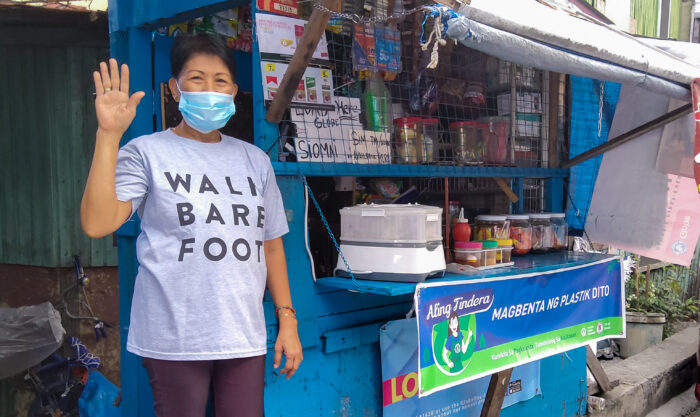From the Field: Empowering Women Entrepreneurs to Combat Plastic Pollution in the Philippines

In the Philippines, USAID’s Clean Cities, Blue Ocean (CCBO) program is supporting innovative, locally-led solutions to address ocean plastic pollution at its source through partnerships with local grantees who are developing scalable solutions with measurable impact.
Program grantee, The Plastic Credit Exchange (PCX), began piloting its Aling Tindera (which, roughly translated from Tagalog, means respected women or “auntie” vendors) network in the City of Manila in December 2020. The model enables women micro-entrepreneurs, many of whom own small, home-based convenience shops called sari-sari stores, to become community collection points for plastics and other low-value waste. Community members and local waste collectors can bring and sell their plastic waste to the Aling Tinderas for cash. Each location is fully equipped with container vans, scales, and balers to condense the plastic and prepare it for recycling and transformation by processing partners.
In addition to providing a new source of local income, the Aling Tindera network provides a local solution for improved waste management and puts plastics and other waste back into developing local circular economies that reduce demand for new plastic production and associated greenhouse gas emissions. A network of local and multinational companies is behind the Aling Tindera model, financing the system through the purchase of “plastic credits.” PCX has developed a global network of companies, including PepsiCo, Colgate-Palmolive, and Nestle, who wish to offset their plastic production and environmental footprint through the purchase of plastic credits with the aim of reducing the flow of plastic into waterways and ultimately, the ocean.
To ensure the sustainability and feasibility of this model, PCX collaborates with various government agencies and industry groups to strengthen policies and frameworks on post-consumer plastic waste management. Along the way, they will capture and learn from the direct experience and results of the Aling Tindera model with the goal to replicate and scale up in other cities.

Setting up the CCBO-supported Aling Tindera Network
In March 2021, PCX began launching its ten USAID-supported and all women-owned Aling Tindera stations in barangays (neighborhoods in Tagalog) in Metro Manila. By August 2021, PCX established five Aling Tindera stations, with each station named after its owner and new-found recycling entrepreneur: Aling Irene, Lorme, Socorro, Janine, and Ligaya.
To launch each Aling Tindera, PCX first entered into a partnership agreement with each Aling Tindera, followed by single-day orientation sessions on proper waste collection, buying prices, basic inventory, use of the equipment (such as the manual plastic balers), as well as health and safety standards and use of protective gear. Orientations are also open to community members, enabling them to learn how they can earn extra income through the waste-to-cash program, what waste is accepted, and how their participation can help reduce ocean plastic pollution.
PCX provides each Aling Tindera with a container van, baler, weighing scales, and protective gear. Using locally sourced materials, building up this infrastructure can take six to eight weeks. Once the stations are fully deployed, each Aling Tindera is responsible for ensuring their stations are in compliance with environmental, health, and safety requirements. PCX conducts weekly check-ins, picks up the packaged plastic waste, and sells it into their manufacturing network where it is often recycled or upcycled into new products. By leveraging the sari-sari stores as central, community hubs for plastic waste reduction, PCX is supporting the development of local, market-based, and inclusive circular economies.
Empowering Women and Achieving Results
In less than a year, the USAID-supported Aling Tinderas have collected, baled, and hauled nearly 23,000kg (22.9 metric tons) of plastics and other low-value waste. Along the way, sari-sari store owners and their families have embraced their new role as partners in the recycling supply chain and have created change in their communities.
Aling Lorme is a prime example of how the Aling Tinderas are engaging and inspiring their families and communities to participate in the movement. Lorme’s husband, Tony, sorts the collected waste according to its type and her adult daughter collects plastic discarded at her office. Lorme uses her social media channels to invite and encourage neighbors to drop off their waste at her shop. Among the Aling Tindera network, Lorme is one of the top collectors and is consistently at the top of the Aling Tindera “leaderboard.” Lorme consistently is able to fill her shipping container every two weeks and continues to invite more neighbors to work together to clean up the environment and earn some extra income.

Another Aling Tindera, Janine, is also creating impact in her community through her collection site. PCX’s Richard De Guzman, who frequently visits the Aling Tindera stations to monitor the pilot and note any areas needing support, hopes to add more women-owned businesses to the Aling Tindera network.
“Janine is a true sustainability champion to her community. In just two weeks, not only has she diverted over 800 kilograms of plastic waste away from the streets of Barangay 161, but she has also helped her neighborhood find ways to make extra income while cleaning up.” – Richard De Guzman
The City of Manila’s Department of Public Services has also noticed the network’s impact in the community. A representative said, “We’re very proud of all the Aling Tindera partners on the ground and how much they’ve done for the City of Manila. We hope that the citizens of the participating and nearby barangays continue to support the program, ensuring a cleaner environment along the streets of Manila.”
PCX aims to grow their network to include 100 Aling Tinderas across Metro Manila.

